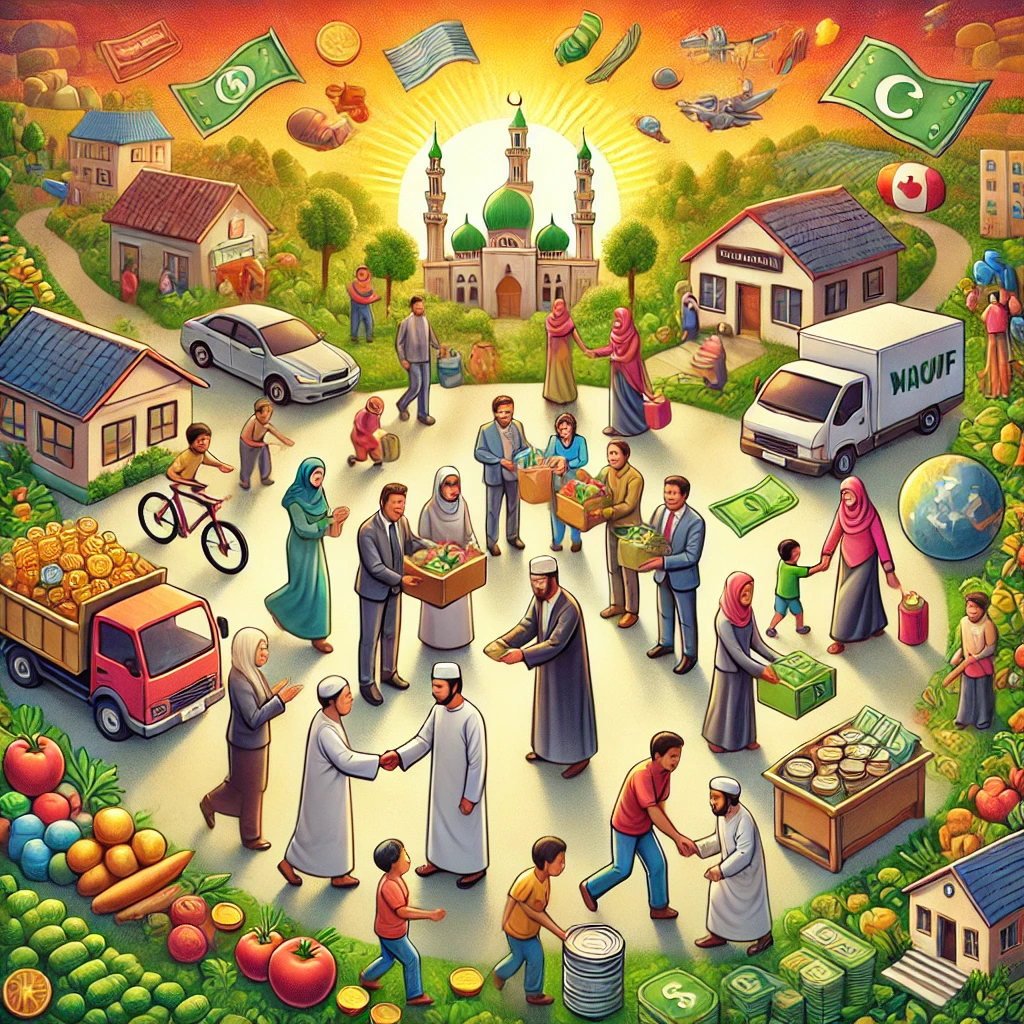In Islamic tradition, the concept of giving to those in need is deeply ingrained. This generosity is expressed through various forms, including sadaqah, zakat, waqaf, and infaq. While these terms may seem interchangeable, they each have distinct characteristics and significance.

Sadaqah: A Voluntary Act of Charity
Sadaqah, often translated as “charity,” is a voluntary act of giving to others. It can be performed in various forms, including money, food, clothing, or time. The Quran encourages sadaqah, emphasizing its spiritual and social benefits.
- Significance: Sadaqah is seen as a means of purifying one’s wealth, seeking Allah’s blessings, and contributing to the well-being of society. It is considered an act of worship that can expiate sins and draw one closer to Allah.
- Quran 2:271: “Spend in the way of Allah and do not throw yourselves with your own hands into destruction. And do good; Allah loves the doers of good.”
- Quran 5:63: “Those who spend their wealth in the way of Allah and then do not follow up their spending with boasting or reproach, their reward is with their Lord, and they will have no fear nor sorrow.”
- Sahih Bukhari: “Charity is a bridge over the Fire.”
- Sahih Muslim: “The best charity is that which is given from a state of poverty.”
Zakat: A Mandatory Alms Tax
Zakat, on the other hand, is a mandatory alms tax levied on Muslims who meet certain financial criteria. It is calculated as a percentage of one’s wealth and is typically distributed to the poor and needy.
- Significance: Zakat is considered a pillar of Islam, and its fulfillment is obligatory for all Muslims who can afford it. It is seen as a way of purifying one’s wealth and ensuring social justice.
- Quran 2:177: “Those who believe in Allah and the Last Day and spend in the way of Allah from what We have provided them, know that Allah will reward them well and will increase their provision. They will be in a state of security. It is He who gives life and causes death. And to Him is the return.”
- Quran 9:5: “If you do not repent, I will punish you and make you taste a severe torment.”
- Sahih Bukhari: “The Prophet (ﷺ) said, ‘The Zakat is due on camels, cattle, sheep, and gold. It is due on the value of the property one possesses, and it is taken from the wealth one has accumulated.’
- Sahih Muslim: “The Prophet (ﷺ) said, ‘Zakat is a purification for the soul and a growth for wealth.'”
Waqaf: A Charitable Endowment
Waqaf is a unique Islamic concept involving the endowment of property or assets for a charitable purpose. The income generated from the waqf is then used to fund various projects, such as mosques, schools, hospitals, or orphanages.
- Significance: Waqaf is considered a sustainable form of charity that can benefit generations to come. It is a way of leaving a lasting legacy and contributing to the betterment of society.
- Quran 2:117: “They spend their wealth in the way of Allah, even though they are in a state of hardship. And if they are in a state of ease, they also spend. Allah has rewarded them for their patience with gardens through which rivers flow. They will abide therein forever, and Allah is pleased with them.” (This verse indirectly refers to the concept of endowing property for charitable purposes.)
- Sunan Abu Dawud: “The Prophet (ﷺ) said, ‘The best charity is a waqf.'”
- Sunan al-Nasa’i: “The Prophet (ﷺ) said, ‘The waqf is a charity that continues to flow even after the death of the one who established it.'”
Infaq: A General Term for Spending in the Way of Allah
Infaq is a broader term that encompasses all forms of spending in the way of Allah, including sadaqah, zakat, and waqaf. It can also refer to spending on other religious activities, such as pilgrimage to Mecca or construction of mosques.
- Quran 2:254: “Spend in the way of Allah and do not throw yourselves with your own hands into destruction.”
- Quran 3:145: “And whatever you spend in the way of Allah will be repaid to you in full, and you will not be wronged.”
- Sahih Bukhari: “The Prophet (ﷺ) said, ‘Whoever spends in the way of Allah, Allah will replace what he has spent and will increase his wealth.'”
- Sahih Muslim: “The Prophet (ﷺ) said, ‘Whoever gives in charity a good deed, Allah will multiply it for him tenfold.'”
Relevance to Current Culture
These Islamic concepts of giving continue to be relevant in today’s world. They offer a framework for individuals and communities to engage in acts of charity and social responsibility. In many Muslim-majority countries, sadaqah, zakat, and waqaf play a significant role in addressing social and economic needs.

Comparison with Modern Society Donations and Tithes
While the Islamic concepts of giving share similarities with modern society’s donations and tithes, there are also key differences. In Islam, the emphasis is on giving as a form of worship and a means of purifying one’s wealth. The specific percentages for zakat vary depending on the type of wealth, but they are generally lower than the tithes or donations commonly practiced in other religions or cultures.
Prominent Islamic Scholars and Legal Experts
1. Yusuf al-Qaradawi (Egypt): A renowned Islamic scholar and television presenter, al-Qaradawi has written extensively on various Islamic topics, including charity and social justice. He has emphasized the importance of sadaqah, zakat, and waqaf in addressing the needs of the community.
2. Sheikh Abdullah bin Bayyah (Mauritania): A prominent Islamic scholar and member of the Muslim Council of Elders, bin Bayyah has advocated for a more inclusive and tolerant understanding of Islam. He has stressed the importance of social justice and charity, particularly in the context of global challenges.
3. Sheikh Muhammad bin Abdul Wahhab (Saudi Arabia): A prominent Islamic scholar and reformer, bin Abdul Wahhab emphasized the importance of following the Quran and Sunnah as the primary sources of Islamic law. He advocated for a strict adherence to the principles of zakat and other Islamic obligations.
4. Sheikh Muhammad Taqi al-Uthmani (Pakistan): A renowned Islamic scholar and legal expert, al-Uthmani has authored numerous books on Islamic jurisprudence. He has provided detailed guidance on the calculation and distribution of zakat, as well as the proper management of waqaf endowments.
5. Sheikh Muhammad Ali al-Hashimi (Iraq): A prominent Islamic scholar and legal expert, al-Hashimi has contributed significantly to the field of Islamic finance. He has explored the potential of waqaf endowments as a tool for economic development and social welfare.
6. Sheikh Khalid Abu Shadi (Egypt): A prominent Islamic scholar and activist, Abu Shadi has focused on social justice and human rights issues. He has advocated for a more equitable distribution of wealth and resources through sadaqah, zakat, and waqaf.
7. Sheikh Muhammad Hussein Adam (Malaysia): A prominent Islamic scholar and legal expert, Adam has contributed to the development of Islamic finance in Malaysia. He has explored the potential of waqaf endowments as a sustainable source of funding for charitable projects.
8. Sheikh Abdullah bin Alawi Al-Haddad (Yemen): A renowned Islamic scholar and Sufi master, Al-Haddad has emphasized the importance of spiritual development and social responsibility. He has encouraged his followers to engage in acts of charity and service to others.
Please note that this list is not exhaustive, and there are many other respected Islamic scholars and legal experts from various countries who have contributed to the understanding of sadaqah, zakat, waqaf, and infaq.
The Six Major Hadith Collections
In Islamic tradition, the six major Hadith collections are considered the most reliable and authentic sources of the Prophet Muhammad’s sayings and actions. These collections were compiled by renowned scholars who spent years verifying and authenticating the hadiths.
1. Sahih Bukhari (d. 870 CE)
- Chronological Order: First
- Number of Hadiths: Approximately 7,377
- Primary Sources: The Prophet Muhammad’s companions (sahaba), their immediate followers (tabi’in), and reliable narrators (mutawatir)
Sahih Bukhari is considered the most authentic Hadith collection in Sunni Islam. Imam Bukhari, a renowned scholar from Samarkand, spent 16 years compiling this collection, applying rigorous criteria for the authenticity and reliability of each hadith.
2. Sahih Muslim (d. 875 CE)
- Chronological Order: Second
- Number of Hadiths: Approximately 3,000
- Primary Sources: Similar to Sahih Bukhari, focusing on reliable chains of transmission (isnād)
Sahih Muslim is another highly regarded Hadith collection. Imam Muslim, a contemporary of Imam Bukhari, spent 15 years compiling this collection, applying similar rigorous standards for authenticity.
3. Sunan Abu Dawud (d. 889 CE)
- Chronological Order: Third
- Number of Hadiths: Approximately 5,270
- Primary Sources: A wider range of narrators, including some whose reliability was questioned by Imam Bukhari and Imam Muslim
Sunan Abu Dawud is a comprehensive collection that includes hadiths from various sources, including some that were considered less reliable by the compilers of Sahih Bukhari and Sahih Muslim. However, Abu Dawud still applied rigorous standards for authenticity.
4. Sunan al-Nasa’i (d. 915 CE)
- Chronological Order: Fourth
- Number of Hadiths: Approximately 5,700
- Primary Sources: A focus on hadiths related to specific topics, such as marriage, divorce, and inheritance
Sunan al-Nasa’i is a collection that focuses on hadiths related to specific topics. It is particularly valuable for scholars studying Islamic law and jurisprudence.
Note: While these four collections are considered the most reliable, there are five other major Hadith collections that are also highly respected: Sunan al-Tirmidhi, Sunan ibn Majah, Muwatta of Imam Malik, Musnad of Imam Ahmad ibn Hanbal, and Sunan al-Darimi. These collections provide additional insights into the Prophet Muhammad’s sayings and actions.

